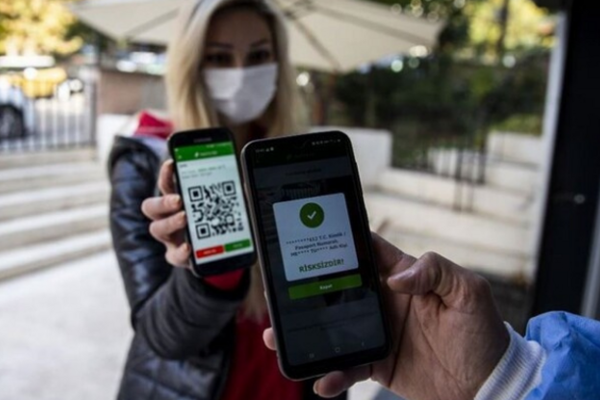Vaccine cards may become compulsory to enter malls, cafes
ISTANBUL


Turkey is considering taking two vital steps in the fight against the pandemic as citizens may be asked to present their vaccine cards to enter certain places and the Turkish COVID-19 vaccine, Turkovac, will be promoted in a bid to stall vaccine hesitancy.
According to the first phase of the action plan authorities call “winter plan against COVID-19,” vaccine cards will be mandatory to enter public places rather than the HES code, the Turkish coronavirus contact tracing system, which shows if people are “risk-free” or not.
People will only be able to enter shopping malls, restaurants, cafes and some other confined spaces with their vaccine cards, according to a report by the daily Hürriyet.
To encourage people to get vaccinated, the second phase of the “winter plan,” an indigenous vaccination campaign, will be put in place.
Turkovac is expected to be in use in November or early December and is planned to be given as a booster shot.
The activation of the indigenous vaccine may quell concerns and increase trust in the COVID-19 jabs, said authorities about Turkovac, which is said to be more effective than the Chinese jab, Sinovac, also an inactivated jab.
Officials said a maximum 300,000 doses of the indigenous vaccine will be produced daily and that a deal with three firms was made.
The Phase 3 trials of the homegrown vaccine have been finished in 30 medical centers across the country. The officials said the Turkovac has shown a higher protection against the U.K. variant of the virus.
Trials against the Delta variant are ongoing, noted the officials.
All eyes are on universities now, where waves of students have physically entered campuses, with officials closely monitoring the situation and whether cases are spreading.
As of Oct. 15, officials said, they expect to see the successive effects of the infection due to the students’ return to the campuses.
Meanwhile, as most of the universities’ boards ask for PCR tests from the students to enter the campuses, long queues have emerged in front of universities’ health centers or hospitals nearby.
“Academics and students have waited for hours to get PCR tests in the universities of Hacettepe, Istanbul Aydın, Sivas Cumhuriyet, Kahramanmaraş Sütçü İmam, Kilis 7 Aralık and Mersin,” daily Milliyet reported.
Students criticized the long queues on social media, uploading photos of students forming large crowds.
“I have been waiting for three hours to have a PCR test in the state hospital in Keçiören [a district in the capital Ankara],” one said.
“They say we are the future of the country, but we cannot enter the campus, how come?” said another.
A student accused Ankara Hacı Bayram Vali University of “committing a violation” for not letting him in.
“There is only one man taking the tests. We cannot see the end of the queue at the PCR test polyclinic of Sivas Cumhuriyet University,” another student complained.
On the other hand, students can be vaccinated on some campuses of universities.
The universities of Bilecik Şeyh Edebali and Nevşehir are two of them. In front the students’ eating halls, vaccination tents have been opened, where students get jabs or information about the vaccination programs, said Milliyet.
Turkey's COVID-19 cases in 0-17 age group double as in-person education resumes
Turkey’s health minister said on Sept. 28 that the number of COVID-19 cases among those aged 0-17 has doubled over the last three weeks with the re-opening of schools.
"While the schools have been open for the last three weeks, the number of cases among those aged 0-17 has doubled. Our average active case is now 400,000,” Fahrettin Koca told reporters.
Noting that a quarter of the total COVID-19 cases have been detected within the 0-17 age group, Koca said the opening of universities in-person will also have an impact on the number of cases.
"As the Coronavirus Scientific Advisory Board and the Health Ministry, we think that all alternatives, including weekend education, should be an option and schools should remain open," he said, adding that the same approach will also be considered for university education.
“We do not want to put more restrictions in the new period,” he stressed.
He also noted that they will offer an alternative option with Turkovac, in addition to the vaccines coming from abroad, so people will be able to choose among the available vaccines.
